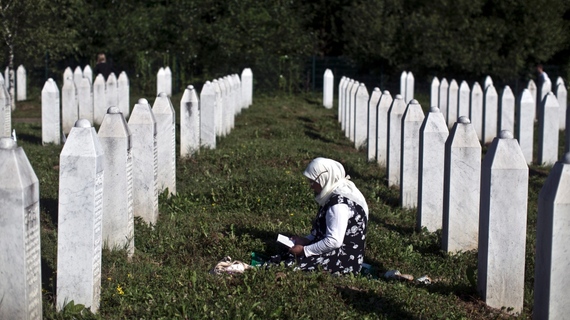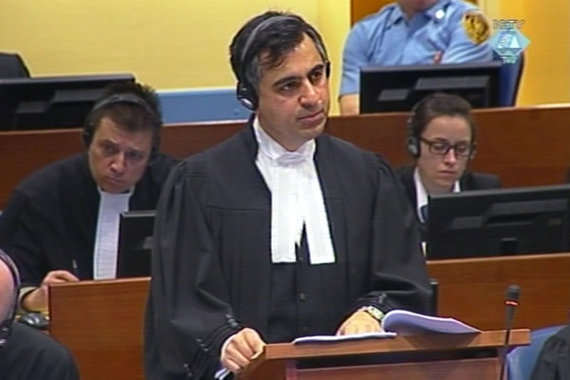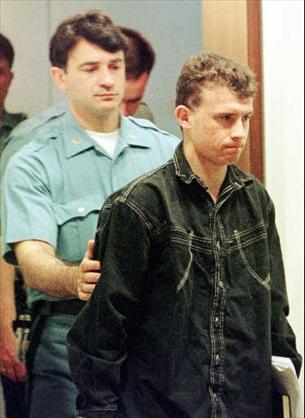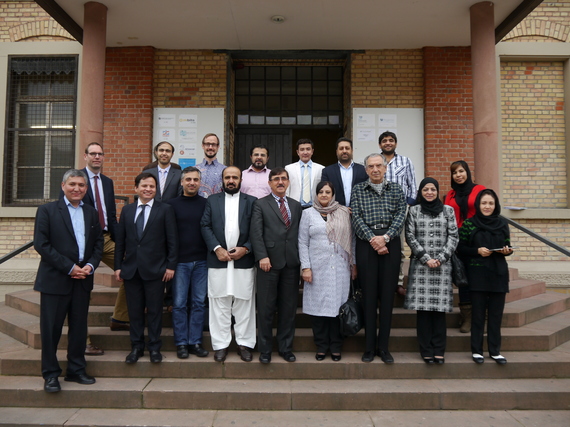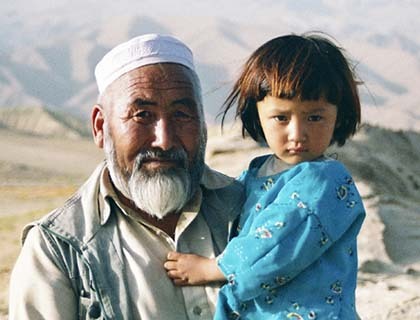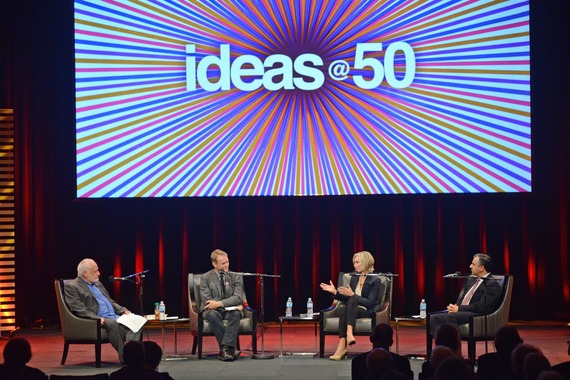The following consists of excerpts from CBC Ideas 50th Anniversary Speech in Toronto on October 22, 2015.
In March of 1996, I came across Dražen Erdemović for the first time. It was an encounter that would profoundly shape my understanding of identity and war.
Erdemović was a soldier in the Bosnian Serb Army. A few months earlier, on July 16, 1995, his brigade had participated in the mass murder of 1,200 unarmed civilians near the town of Srebrenica. The victims' only "crime" was that they were Muslims. Such was the unspeakable evil of "ethnic cleansing."
The men and boys, some as young as 14, had arrived in buses, blindfolded, with their hands tied behind their backs. They were lined up and then shot, their lifeless bodies dumped in mass graves by bulldozers. To this day, the grieving mothers of Srebrenica search for the remains of their missing children.
Mourning at the Srebrenica cemetery I had been assigned to prosecute Erdemović before the UN war crimes tribunal. I had arrived at The Hague, a young, idealistic lawyer, still in his 20s, intent on seeing justice done.
But I had imagined this historical case differently. As I stood across the courtroom from the defendant, instead of moral triumph or righteous rage, I felt sorry for him. He too was in his 20s, an ethnic Croat, married to an ethnic Serb, the young father of an infant child.
At the UN Tribunal for Yugoslavia
Amidst Bosnia's horrific ethnic war, he belonged to that half of the population that came from mixed marriages. As the warlords of Yugoslavia incited ethnic hatred and violence in their diabolical quest for power, and ripped the country apart in the process, the likes of Erdemović were placed in an impossible situation. "I could not refuse" to kill the prisoners, he testified, weeping before the court, "because then they would have killed me."
"I am not sorry for myself", he added, I am sorry for my wife, for my son, "for all the victims ... regardless of their nationality. I have lost many very good friends." We "were not in favor of a war" but there was "no other choice. This war came and there was no way out."
Dražen Erdemović at The Hague (1996)
In those days, the pundits and policy-makers were fascinated by Samuel Huntington's theory about the so-called "clash of civilizations." But in the ivory tower or the corridors of power, few had taken the trouble to speak with people like Erdemović on the streets of multiethnic Sarajevo.
This Manichean construction of reality was inspired by conceiving Bosnia as the historic "fault line" between the Habsburg and Ottoman Empires, condemned to a repetition of past wars. It was at once a cynical and naïve abstraction, a new dividing line for humankind, oblivious to the artificiality of the conflict. It offered newly-imagined demons in the search for self-definition amidst the chaos of the post-Cold War world. Certainty amidst uncertainty. In those years, the mutually assured destruction of nuclear war had kept the world at peace. Instead, superpower rivalry was played out on the periphery, through proxy wars in the Global South, at the expense of other people, the hapless victims of now forgotten genocides.
Today, as we witness the fragmentation of the post-9/11 world, as we witness the spread of war and violent extremism, as the "clash of civilizations" that was once confined to Bosnia becomes a widespread belief about our future, what can we surmise about identity and war in the next 50 years?
In my view, the world is moving in two opposite directions. On the one hand, we witness the corrosive spread of divisive ideologies and identities, of violent extremism and war, afflicting not only distant lands, but also our national identity, welfare and security as Canadians.
On the other hand, we witness the inexorable forces of globalization, the blurring of hitherto sacrosanct boundaries and assumptions, the emergence of a shared humanity and common identity. These twin processes, one of distintegration, and the other of integration; one of destruction, and the other of construction -- these opposing forces are the contemporary dividing line, not between civilizations, but between the past and the future.
It can even be said that there is a dialectical relationship between the two. As old divisive worldviews crumble under the strain of globalization, retrenchment into familiar divisive habits becomes increasingly tempting, though ultimately futile.
Of course, the Global Village is now in its post-romantic phase. We now realize that beyond a "feel-good" cosmopolitan sentiment, it also represents the spread of unbridled consumerism, the poisoning of our planet, the enrichment of the few at the expense of many, the gradual disappearance of authentic human connections, quite simply, the paradoxical loss of hope in a world of plenty.
And this virulent corruption, this profound alienation, is intrinsically linked with the appeal of imagined identities, rooted in mythical pasts, of glorifying xenophobia in cataclysmic ideologies of infantile regression, promising a return to a world where everything was familiar and pure. Either way, interdependence can no longer be dismissed as merely a vague and pious aspiration. It is an inescapable reality; a reality that connects both our physical survival and spiritual welfare with an ever-widening circle of others.
Recently, I was with the Afghanistan Human Rights Commission. A survivor of the 1998 Mazari-i-Sharif massacre told me how the Taliban went door to door, killing some 2,000 Hazara civilians. He reminded me of the world's painful silence in the face of this abomination. Back then, it was not politically opportune to condemn such atrocities because the Taliban served a useful purpose. This was the world before September 11.
With the Afghanistan Human Rights Commission
The American statesman, Zbigniew Brzezinski famously asked, what is more important: "The Taliban or the collapse of the Soviet empire? Some stirred-up Moslems or the liberation of Central Europe and the end of the cold war?"
He was of course gloating over the supposedly "brilliant" strategy, championed earlier by the likes of Henry Kissinger, of unleashing jihadist fury against the Soviet Union. It was called "political realism": unleashing an evil genie without thinking if it could be put back in the bottle.
Shakespeare said it best in Macbeth: "That we but teach bloody instructions, which, being taught, return to plague the inventor."
The contemporary balance of power politics in the Middle East, the escalating wars wreaking havoc, ripping the region apart; the sectarian violence and religious fundamentalism exploited as a weapon for supremacy; these dangerous currents have been a long time in the making, and they have far-reaching and real consequences. The so-called "Islamic State" did not appear out of thin air; the refugee exodus from Syria and Iraq did not happen overnight. All these tragedies were hatched in the sinister incubator of "brilliant" strategies.
Hazara man with grandchild in Afghanistan
When we ponder the future, of a growing population competing for scarce resources, of religious wars and genocide, should we have any doubt that without a fundamental change in course, these violent currents will inevitably spill over and afflict us here in Canada? Should we be surprised that left unchallenged, the myth of a clash of civilizations will invariably become a reality? As the world falls apart, will we continue to debate niqab etiquette? Or will we embrace the urgency of making a sustained and lasting contribution to creating a different future; a coming of age, free from the scourge of wars that are the relics of an adolescent past?
It is famously said that: "The Holocaust did not begin in the gas chambers. It began with words." In the same way, the better world that we will build also begins with words. The Persian poet Rumi famously wrote: "Raise your words, not your voice. It is rain that grows flowers, not thunder." We should not underestimate the power of our words, of our voices, of speaking truth to power, of personal transformation and service to humanity. Cynicism is not only cowardly; it is also ignorant. It is blind to the inescapable reality of interdependence; oblivious to the fundamental oneness of humankind.
I have seen many terrible things in my human rights career. It has made me lose a lot of sleep. It has left deep wounds. But it has also shown me the profound nobility and astonishing resilience of the human spirit.
I will conclude by sharing with you my belief, which may strike you as audacious, or naïve, or both; that a world at peace is not only possible, but inevitable. It is the next stage in our collective evolution. The only question is whether we will achieve it after unimaginable horrors precipitated by our stubborn clinging to old patterns of behaviour; or whether we will achieve it by choice.
